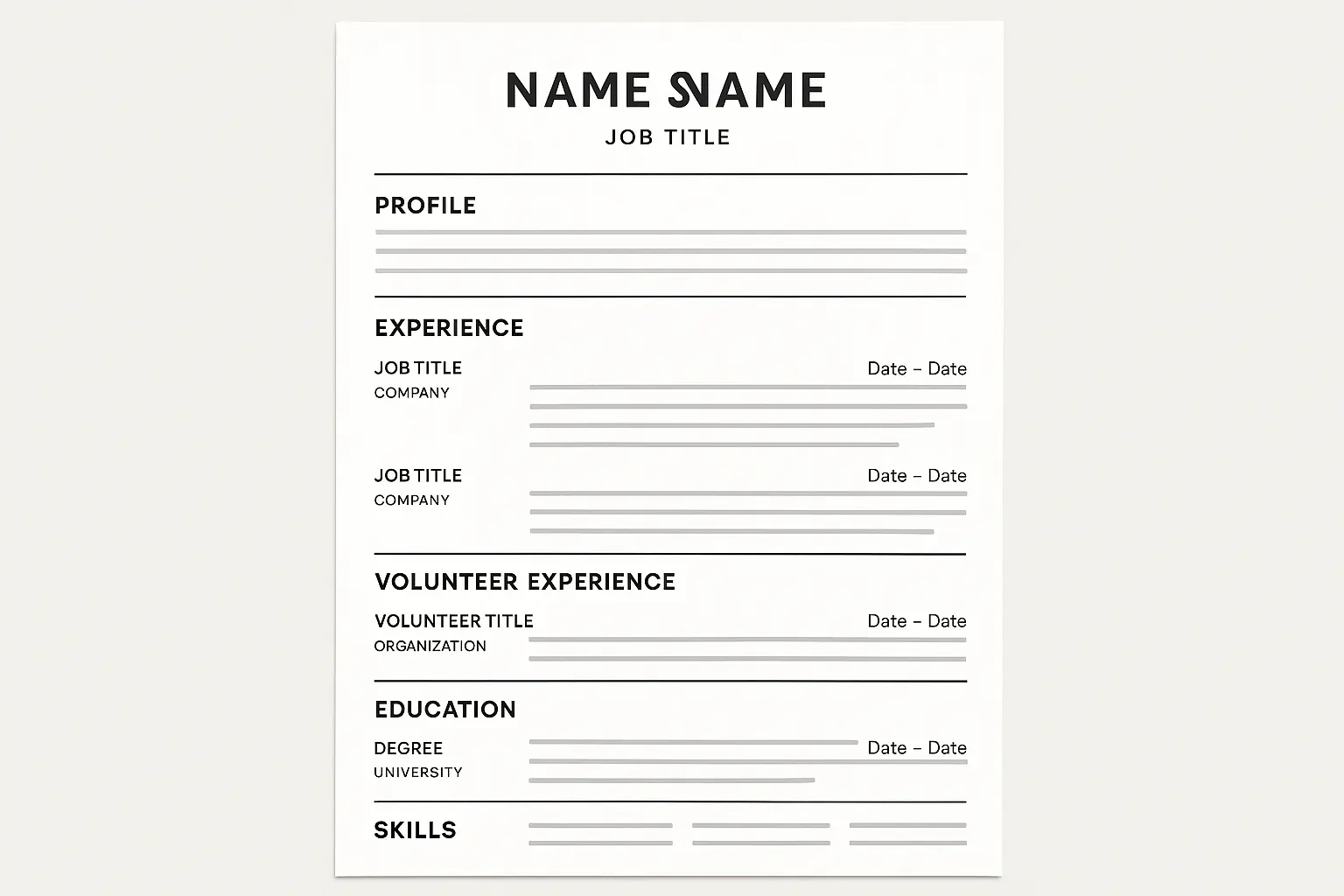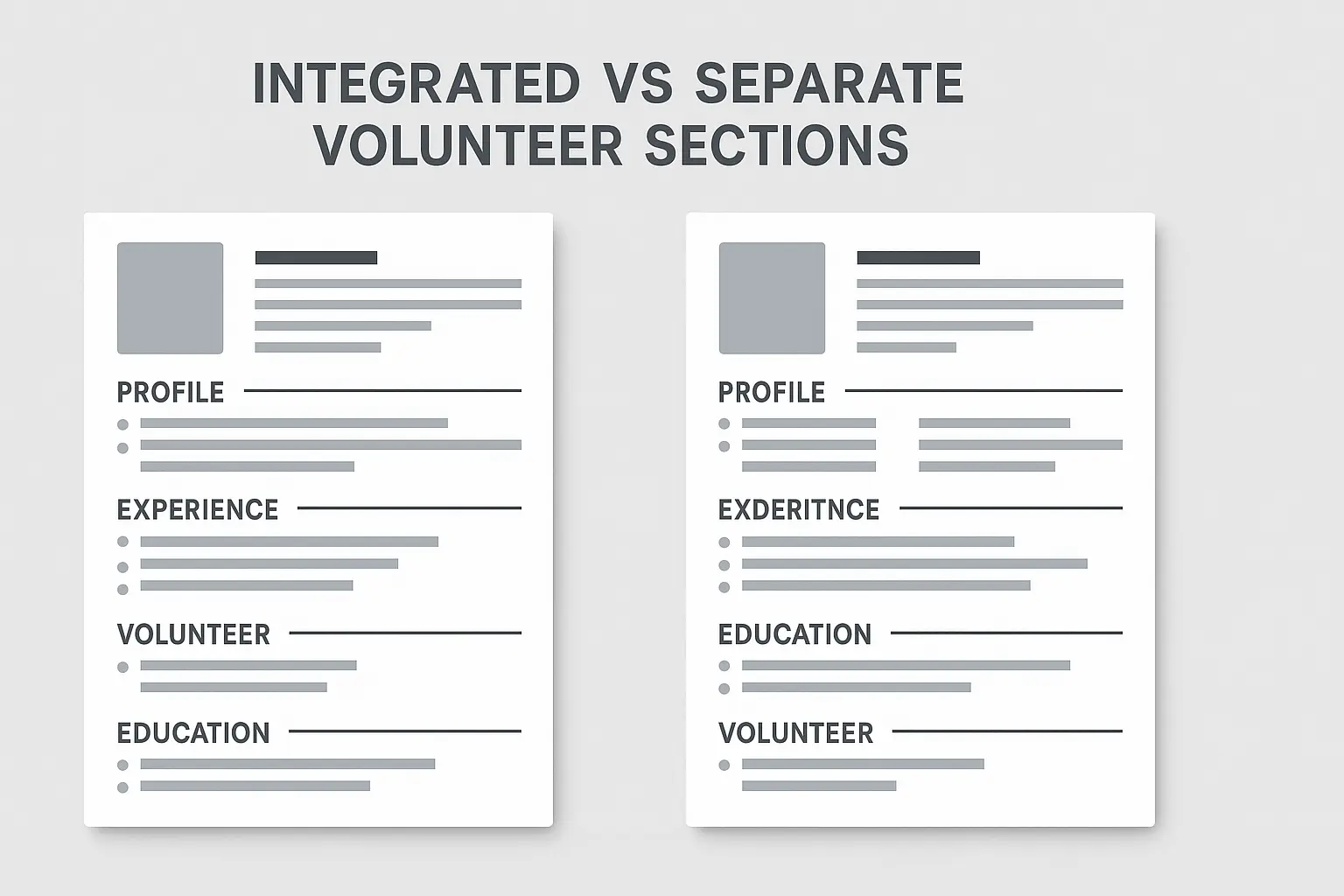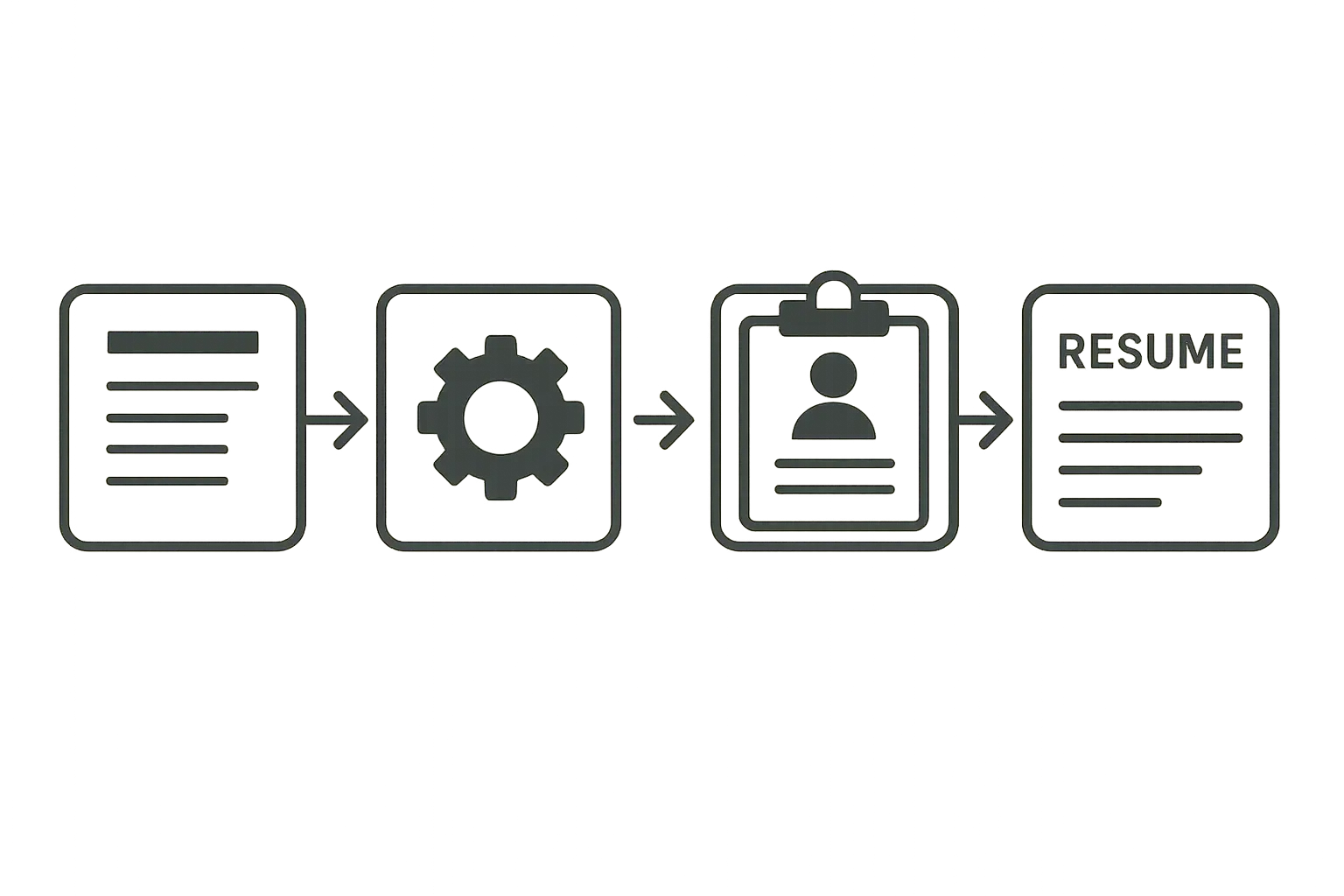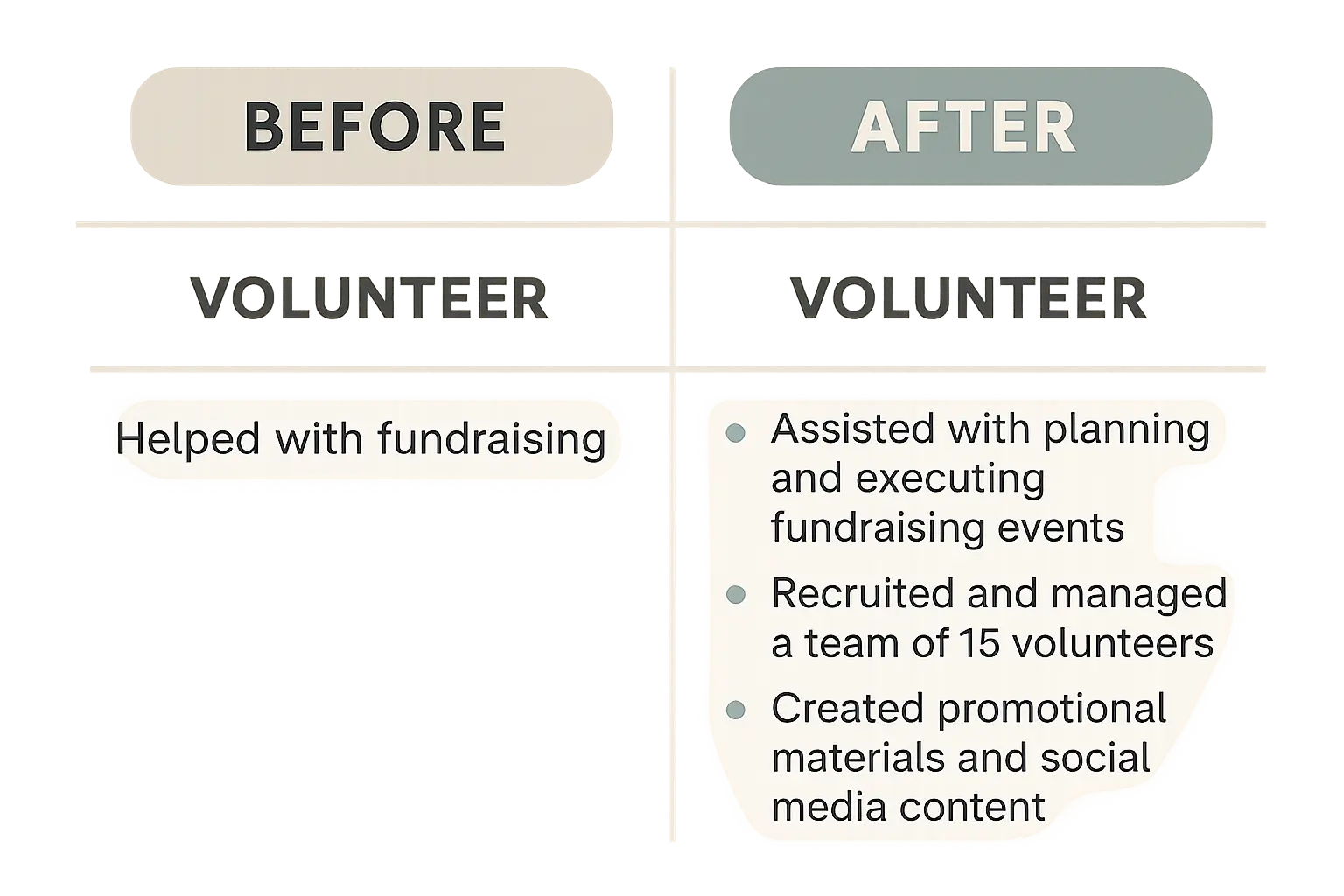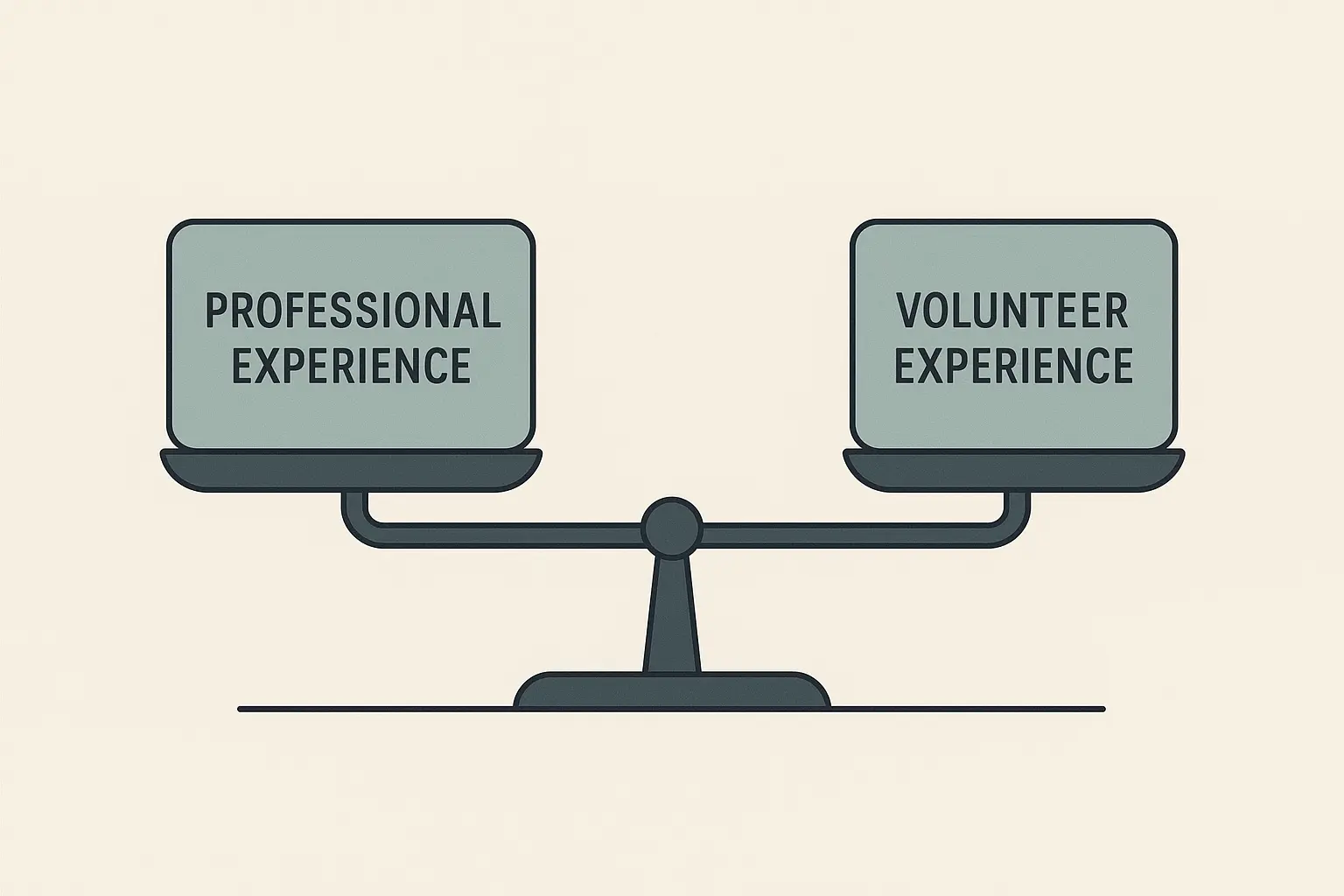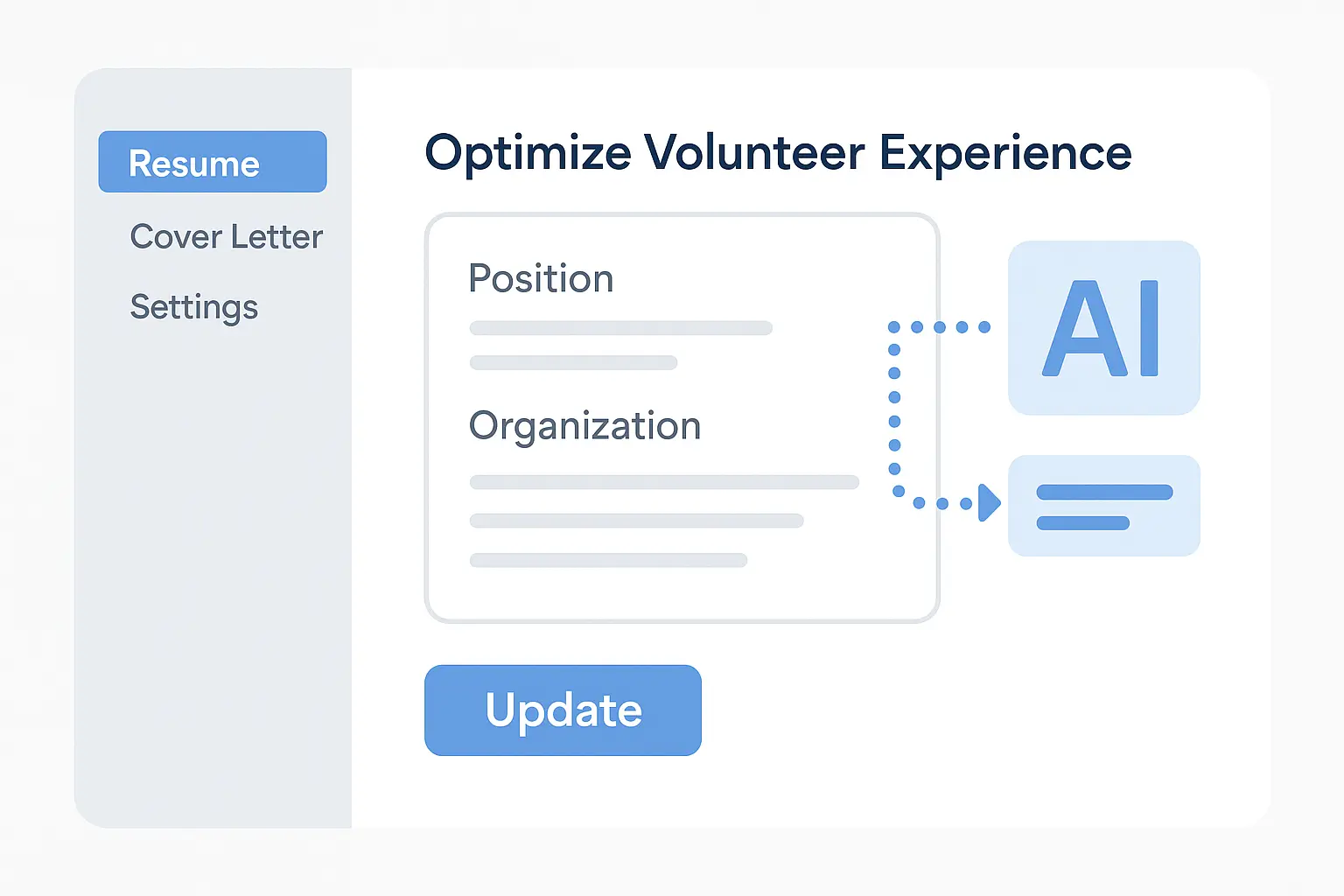How to Put Volunteer Work on Resume: The Complete Strategy Guide That Actually Gets You Hired

You know that feeling when you’re staring at a mostly blank resume? Maybe you’re fresh out of college, switching careers, or getting back into the workforce. You’ve got all this volunteer experience, but you’re not sure if it “counts” as real work experience.
Here’s the thing: it absolutely does. That time you organized the charity 5K? You managed a project. Those weekends at the food bank? You handled logistics and worked with diverse teams. Your volunteer work isn’t just nice-to-have fluff—it’s proof you can get things done.
Recent research shows that volunteer work can be particularly valuable for entry-level candidates, with high school, college and university graduates often lacking paid work experience to list on their resume as they have been studying instead of working according to Rosterfy. This makes volunteer experience a crucial differentiator for new professionals entering the job market.
The problem? Most people treat their volunteer work like an afterthought, burying it at the bottom of their resume with weak descriptions that don’t capture the real value they brought to organizations. I’m going to show you exactly how to put volunteer work on resume strategically, so it becomes a powerful asset that hiring managers actually notice and respect.
Table of Contents
-
Strategic Placement: Where Your Volunteer Work Makes the Biggest Impact
-
Making Your Volunteer Work Sound Professional
-
Choosing What Actually Matters
-
Your Action Plan
-
Common Mistakes That’ll Kill Your Chances
-
Resume Builder IQ: Your Secret Weapon for Volunteer Experience Optimization
TL;DR
-
Position volunteer work strategically based on your career stage and industry – sometimes it deserves its own section, other times it works better mixed into your work experience
-
Write volunteer descriptions using the same professional language and action verbs you’d use for paid positions, including specific numbers and results
-
Choose volunteer experiences that directly support your career goals and show relevant skills, not just any community involvement
-
Format volunteer content to be ATS-friendly while keeping it readable for humans
-
Avoid underselling your contributions or letting volunteer work overshadow your professional experience
Strategic Placement: Where Your Volunteer Work Makes the Biggest Impact
Look, here’s the deal with placement: most people just dump their volunteer stuff at the bottom of their resume like it’s an afterthought. Big mistake. Where you put this experience can be the difference between a hiring manager taking you seriously or skipping right over you.
Think about it from their perspective. They’re scanning your resume in about 10 seconds. If your volunteer work is buried under “Hobbies and Interests,” they’ll never see that you actually managed a team of 20 people or handled a $50,000 budget.
Should You Create a Separate Section or Mix It In?
This isn’t rocket science, but it does require some strategic thinking when you put volunteer work on resume.
Go with a dedicated “Volunteer Experience” section when:
-
You’ve been volunteering consistently for months or years
-
Your volunteer role involved real responsibility (not just showing up to stuff envelopes)
-
The skills you used directly relate to jobs you want
Mix it into your work experience when:
-
You’re light on paid work experience
-
Your volunteer role is basically identical to a job you’d get paid for
-
You want to show continuous activity during employment gaps
Here’s what this looks like in practice:
Fundraising Coordinator
Local Animal Shelter | 2019 – Present
-
Increased annual donations by 40% through targeted donor outreach campaigns
-
Managed volunteer team of 15 for monthly adoption events
-
Created social media strategy that boosted shelter visibility by 200%
See how that reads exactly like a paid position? Because functionally, it was.
When considering how to put volunteer work on resume effectively, understanding professional resume format principles ensures your volunteer section maintains the same high standards as your work experience.
Industry Expectations Matter More Than You Think
Different fields care about volunteer work differently, and ignoring this can hurt you.
Corporate and Business Environments
Business sectors appreciate volunteer experience that shows professional skills, leadership experience, and measurable outcomes. They want to see that you can deliver results and manage responsibilities, whether you’re getting paid or not.
Leading companies now recognize the value of volunteer experience, with their recruiting specialists noting that school projects or volunteer work that you took a lead role in may all be relevant experiences, even if they’re not something that you’re getting paid for according to Deloitte Services LP.
Healthcare and Social Services
If you don’t have relevant volunteer experience in these fields, it’s almost weird. They expect to see genuine commitment to helping people. Direct service volunteer work that relates to patient care, community health, or social service delivery should be prominently featured.
Technology and Creative Industries
They love seeing you use your skills for good causes. Built a website for a nonprofit? Designed marketing materials for a community event? Perfect. These industries appreciate candidates who use their skills to make a difference in unique ways.
Making Your Volunteer Work Sound Professional
This is where most people mess up. They write about their volunteer experience like they’re apologizing for it instead of owning what they accomplished.
Write Like It’s a Real Job (Because It Was)
Stop using wimpy language. “Helped with” and “assisted in” make you sound like you just carried boxes around. You probably did way more than that.
Instead of: “Helped with fundraising activities”
Try: “Coordinated annual fundraising campaign that exceeded goal by 30%”
Instead of: “Worked with homeless population”
Try: “Provided direct services to 50+ individuals experiencing homelessness weekly”
Use the same strong action words you’d use for paid work: managed, created, implemented, coordinated, developed. Because that’s probably what you actually did.
Using powerful resume action words transforms basic volunteer descriptions into compelling professional statements that capture hiring managers’ attention.
Professional presentation of volunteer work is crucial, as demonstrated by successful examples like the volunteer who Led the university beach clean-up effort… The event resulted in 127 bags of garbage being removed from three local beaches in one weekend according to Rosterfy, showing how specific metrics make volunteer contributions more compelling.
Numbers Make Everything More Believable
Whenever possible, throw in some concrete details. How many people did you work with? How much money was involved? What were the results?
-
Trained 12 new volunteers in safety protocols
-
Organized events for 200+ community members
-
Managed inventory worth $15,000
-
Reduced wait times by 25% through process improvements
Transform weak volunteer descriptions into powerful professional statements:
Before: “Helped with dog charity activities”
After: “Trained 15+ new volunteers in animal care protocols and facility operations, resulting in 30% improvement in volunteer retention and more consistent animal care standards”
The impact of volunteer work can be substantial, as demonstrated by successful fundraising examples where volunteers Wrote nine successful grant applications worth $267,000 according to Rosterfy, showing the significant financial and professional impact volunteer roles can have.
Don’t Overthink the ATS Stuff
Yes, you want your resume to get through applicant tracking systems. But don’t sacrifice readability for keyword stuffing. Just use normal professional language that describes what you actually did.
If the job posting mentions “project management,” and you coordinated a volunteer project, use those words naturally in your description. Don’t force it.
Understanding ATS-friendly resume formatting ensures your volunteer experience section passes automated screening while maintaining professional appeal.
Here’s how volunteer activities translate to professional terms:
|
Volunteer Activity |
Professional Translation |
Key Skills |
|---|---|---|
|
Organized fundraising events |
Event Management & Strategic Planning |
Project management, stakeholder engagement, budget oversight |
|
Taught computer skills to seniors |
Training & Development Leadership |
Adult education, curriculum development, technical training |
|
Managed food bank operations |
Operations Management & Logistics |
Supply chain, inventory management, team coordination |
|
Led youth mentoring program |
Program Development & Leadership |
Mentoring, program evaluation, youth development |
Choosing What Actually Matters
Here’s some tough love: not every volunteer experience belongs on your resume. That one-time beach cleanup from three years ago? Probably not resume-worthy unless you organized the whole thing.
The “So What?” Test
For each volunteer experience, ask yourself: “So what? Why should an employer care about this?”
Good reasons to include something:
-
You learned skills relevant to your target job
-
You showed leadership or took initiative
-
You achieved measurable results
-
It demonstrates character traits the employer values
Reasons to leave it out:
-
It was a one-time event with no real responsibility
-
It’s completely unrelated to your career goals
-
It might raise questions about your availability for work
-
It’s controversial in a way that could hurt your chances
The Relevance Filter
Look at job postings for roles you want. What skills and qualities do they mention repeatedly? If your volunteer work demonstrates those things, it belongs on your resume. If not, maybe save that space for something more relevant.
For those with limited professional background, learning how to write a resume with no experience can help you leverage volunteer work effectively to fill experience gaps.
Your Action Plan
Ready to actually do this? Here’s your step-by-step process for how to put volunteer work on resume effectively.
Step 1: Brain Dump Everything
List out all your volunteer experiences from the past 5-10 years. Don’t filter yet – just get it all down.
Step 2: Identify Your Best Stuff
Pick the 3-5 experiences that best demonstrate skills relevant to your target jobs. Look for leadership roles, significant time commitments, and measurable achievements.
Modern resume best practices emphasize the importance of relevant volunteer experience, with career experts noting that Volunteer Work & Leadership Roles are great for showing initiative according to Cape Cod Times career guidance from SCORE mentors.
Step 3: Write Professional Descriptions
For each experience you’re including:
-
Start with a strong action verb
-
Include specific details and numbers
-
Focus on what you accomplished, not just what you did
-
Use professional language (but keep it natural)
Step 4: Decide on Placement
Based on your career stage and the strength of your volunteer experience, decide whether to create a separate section or integrate it elsewhere.
Step 5: Format Consistently
Make sure your volunteer experience follows the same format as your work experience – same fonts, same date format, same bullet point style.
Consider exploring what to put on a resume to ensure your volunteer experience complements rather than competes with other essential resume sections.
Complete volunteer experience optimization checklist:
Pre-Integration Checklist:
-
Audit current resume for gaps and weak points
-
List all volunteer experiences from past 5-10 years
-
Identify 3-5 most relevant experiences for target role
-
Gather specific metrics and achievements for each
-
Research target company’s values and community involvement
-
Choose appropriate section placement strategy
-
Draft descriptions using professional action verbs
-
Include relevant keywords from job descriptions
-
Format consistently with professional experience
-
Review for ATS compatibility
-
Get feedback from industry professionals
-
Test different versions with career counselors
Common Mistakes That’ll Kill Your Chances
Don’t Undersell Yourself
The biggest mistake I see? People treating their volunteer work like it doesn’t count. If you managed people, say you managed people. If you handled a budget, mention the budget. If you solved problems, talk about the problems you solved.
Volunteer leadership positions require appropriate emphasis and professional treatment equivalent to paid leadership experience. Don’t minimize roles where you led teams, managed budgets, or oversaw significant initiatives just because you weren’t receiving a paycheck.
Don’t Go Overboard Either
On the flip side, don’t let volunteer work take over your entire resume. If you’re an experienced professional, your paid work should still be the star of the show. Volunteer experience should enhance your story, not overshadow your career.
When volunteer experience overwhelms professional qualifications, it can actually hurt your candidacy, particularly for experienced professionals where the focus should remain on career achievements and professional growth.
Watch Out for Red Flags
Be thoughtful about including volunteer work with organizations that might be controversial. I’m not saying you should hide your values, but consider your audience. A conservative company might not love seeing extensive volunteering with highly political organizations, and vice versa.
Also, if you’re volunteering 40 hours a week while job searching, that might make employers wonder about your availability and commitment to a full-time role.
Resume Builder IQ: Your Secret Weapon for Volunteer Experience Optimization
Resume Builder IQ’s AI-powered platform takes the guesswork out of incorporating volunteer work into your resume by providing smart formatting suggestions, professional language optimization, and strategic positioning recommendations tailored to your specific industry and career goals.
Our platform analyzes the relationship between your volunteer experiences and target roles, automatically suggesting the most effective presentation approach while ensuring ATS compatibility. The AI writing tools help you craft compelling descriptions that translate volunteer activities into professional achievements using industry-appropriate language and keywords.
With 24/7 support and industry-specific insights, Resume Builder IQ helps you avoid common pitfalls like underselling contributions or creating balance issues. Our professional templates maintain consistent formatting standards across all sections, ensuring your volunteer experience integrates seamlessly with your professional background.
Ready to transform your volunteer experiences into powerful professional assets? Try Resume Builder IQ’s intelligent resume optimization today and discover how strategic volunteer work presentation can strengthen your candidacy and demonstrate your well-rounded character to potential employers.
The Bottom Line
Your volunteer work is real experience that developed real skills. Stop treating it like a consolation prize and start presenting it like the professional experience it actually is.
Whether you’re a recent graduate trying to fill out a thin resume or a career changer showing you’ve got relevant skills, knowing how to put volunteer work on resume can be a game-changer – if you present it right.
The key is being strategic about what you include, professional in how you describe it, and confident in the value you brought to those organizations. Because at the end of the day, making a difference in your community while developing valuable skills? That’s exactly the kind of person most employers want to hire.
Remember that hiring managers are looking for well-rounded candidates who bring both technical skills and character to their organizations. Your volunteer experience provides concrete evidence of both, showing that you’re someone who takes initiative, develops skills continuously, and contributes positively to any environment you join.

